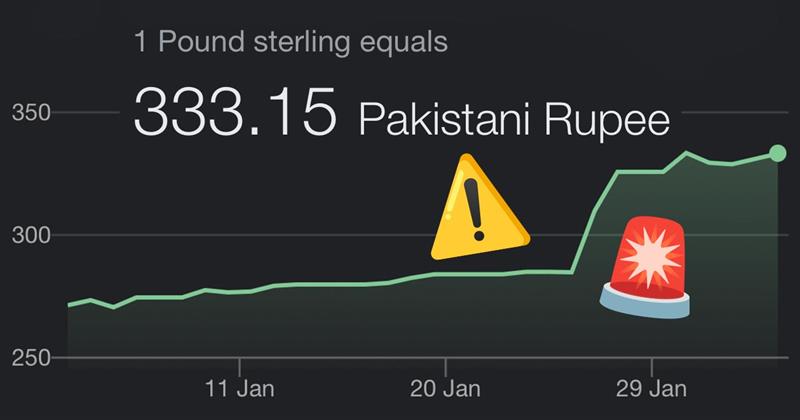Pakistan’s economy, which was showcased as the benchmark for economic growth and progress in the 50s and 60s, is at the brink of a complete collapse. This is all down to corruption, mismanagement, political instability, and the wrong priorities.
The Pakistani rupee has dramatically lost its value by about 60 per cent in the last 12-18 months, with the biggest fall being seen in the last few weeks. The latest drop in value was due to the government relaxing its control on the exchange rate and letting market forces determine it. This was done in a bid to secure an IMF (International Monetary Fund) bailout package by complying with one of its prerequisites. Inflation is reported to have touched 43 per cent year-on-year this January.
The other conditions of the IMF package are reported to include a rise in utility rates, hike in petrol prices, and higher tax collection: all of which will fuel further inflation. Necessities are falling beyond the reach of the common man, and the already impoverished class is struggling to stay afloat.
Deadly Sindh crowd crush
An incident a few days back, in the province of Sindh, saw a man being crushed to death in a mob that had gathered to collect dough being distributed by government officials. This made the headlines in print, digitally, and social media, as it epitomised the abject misery the common people of Pakistan are facing.
In addition, Pakistan’s foreign reserves have dwindled to a record low of approximately $3 billion – just about enough to sustain imports for two weeks. Immediate foreign currency loan repayments to multilateral and bilateral lenders amount to a further $5 billion. It is feared that if the IMF bailout package doesn’t materialise, Pakistan will default on its foreign currency obligations within days.
Pakistani banks are not able to fulfil their payment commitments against imported goods, thereby resulting in thousands of containers being left stranded at ports. A severe food shortage is expected in parts of the country in the coming weeks as the existing reserves are fast depleting, and the new arrivals are not being cleared at ports. There is also the fear that Pakistan may very soon run out of enough foreign currency to buy oil. The country’s transport system may, therefore, come to a standstill.
Imports > exports
There was a power outage about a week ago for several hours across the entire country, but the exact reason is still unknown. Many suspect that it was because of the delay in making capacity payments to independent power plants, which meet a significant portion of electricity demand.
In addition, Pakistan has been importing a lot more than it has exported, thus putting pressure on its current account.
In 2021-22, Pakistan imported approximately $80 billion, while it exported only about $30 billion. Record foreign remittances of close to $31 billion narrowed the gap, but not without putting pressure on the exchange rate.
The countries that have often supported Pakistan in past financial challenges are now seen to be distancing themselves from releasing unconditional loans. The Gulf states and China have all tied further aid with conditions quite like those attached with the IMF bailout package.
Political and terror attacks
Political observers comment that the economic problems compounded after the ruling coalition led by the Pakistan Tehreek-e-Insaf was dramatically brought down in a matter of days, in April last year.
After a parliamentary vote of no confidence, many were led to believe – largely because of the claims made by the ex-Prime Minister, Imran Khan – that Khan’s ouster was the result of a conspiracy cooked up by the military establishment of Pakistan and the US government. Khan’s claims are believed to be true by a large segment of voters. He has suggested that he was removed from office, because of his rising popularity and a refusal to take dictation from the West and the Pakistani military establishment.
As if economic and political turmoil were not enough, Pakistan has recently been rattled by terrorist attacks in Peshawar, the capital city of the north-western province of Khyber Pakhtunkhwa.
A suicide attack in a local mosque killed at least 100 worshippers, before a faction of the Pakistani Taliban claimed responsibility. Just a few days ago, there was also a massive blast in a police station in Peshawar that claimed 59 lives. Moreover, there has been regular shelling in the past few weeks and months from the Afghan side at the Pakistan-Afghanistan border.
Pakistan is embroiled in myriad severe challenges, but the one posing the most immediate threat is economic.
Unless a large bailout package is successfully negotiated with the IMF, Pakistan is looking down the barrel of economic chaos and disintegration.
Source: Islam21c









